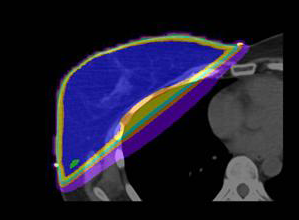
A trial of over 1,000 women, monitored over 5 years, provides the evidence needed to change clinical practice across the UK to use IMRT in the treatment of early stage breast cancer.
This study is the largest randomised trial comparing the treatment-induced side effects of standard radiotherapy with IMRT for treating early stage breast cancer.
The trial, funded by leading research charity Breast Cancer Campaign and supported by the NIHR Cambridge Biomedical Research Centre, was led by Dr Charlotte Coles and colleagues at the Cambridge Breast Unit at Addenbrooke’s Hospital.
Over 1,000 women were recruited onto the trial between 2003 and 2007, and assigned at random to receive either standard radiotherapy or IMRT. No difference in survival rates or cancer recurrence rates were expected from the different treatment groups as the study was designed solely to compare the treatment-related complications of different types of radiotherapy.
Standard radiotherapy can deliver an uneven dose of radiation across breast tumours, producing hotspots of higher dose radiation. This can cause unpleasant side effects including shrinkage, dilated blood vessels under the skin, and hardening or swelling of tissue.
Intensity modulated radiotherapy (IMRT) is an advanced radiotherapy technique that takes into account the shape of the breast to even out the radiation dose across the tumour. This means the cancer cells are targeted with a more consistent dose of radiation treatment and the method reduces the amount of radiation spreading onto the healthy tissue surrounding the tumour.
The women taking part in the trial were assessed 2 years after their treatment and again 5 years after treatment. In both assessments those who had received IMRT experienced fewer dilated blood vessels under the skin, and improved cosmetic appearance.
Dr Charlotte Coles, Consultant Clinical Oncologist, said, ‘We strongly believe that quality of life is important, as well as saving lives as cosmetic results from radiotherapy have a real impact once treatment is finished. It’s not trivial or a question of vanity. Poor cosmetic results can affect psychological wellbeing as well leaving a physical scar. It’s a visible reminder to the woman that she has had cancer.’
The study confirms the benefits of using IMRT. The paper, published this week in the Journal of Clinical Oncology, concludes, ‘These results are practice changing and should encourage all centers still using the two-dimensional RT to implement simple breast IMRT.’
Image credit: Dr Charlotte Coles















